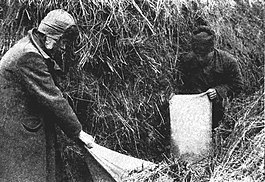 Global Information
Global InformationKulak information

| Politics of the Soviet Union |
|---|
 |
|
Kulak (/ˈkuːlæk/ KOO-lak; Russian: кула́к; plural: кулаки́, kulakí, 'fist' or 'tight-fisted'), also kurkul (Ukrainian: куркуль) or golchomag (Azerbaijani: qolçomaq, plural: qolçomaqlar), was the term which was used to describe peasants who owned over 8 acres (3.2 hectares) of land towards the end of the Russian Empire. In the early Soviet Union, particularly in Soviet Russia and Azerbaijan, kulak became a vague reference to property ownership among peasants who were considered hesitant allies of the Bolshevik Revolution.[1] In Ukraine during 1930–1931, there also existed a term of podkulachnik (almost wealthy peasant); these were considered "sub-kulaks".[2]
Kulak originally referred to former peasants in the Russian Empire who became wealthier during the Stolypin reform of 1906 to 1914, which aimed to reduce radicalism amongst the peasantry and produce profit-minded, politically conservative farmers. During the Russian Revolution, kulak was used to chastise peasants who withheld grain from the Bolsheviks.[3] According to Marxist–Leninist political theories of the early 20th century, the kulaks were considered class enemies of the poorer peasants.[4][5] Vladimir Lenin described them as "bloodsuckers, vampires, plunderers of the people and profiteers, who fatten themselves during famines",[6] declaring revolution against them to liberate the poor peasants and middle peasants from their counter-revolutionary collaboration with foreign capitalism.[7]
During the first five-year plan, Joseph Stalin's all-out campaign to take land ownership and organisation away from the peasantry meant that, according to historian Robert Conquest, "peasants with a couple of cows or five or six acres [~2 ha] more than their neighbors" were labeled kulaks.[8] In 1929, Soviet officials officially classified kulaks according to subjective criteria, such as the use of hired labour. Under dekulakization, government officials seized farms and killed many kulaks,[4][9] deported others to labor camps, and drove many others to migrate to the cities following the loss of their property to the collectives.[10]
- ^ Cite error: The named reference
anl2345was invoked but never defined (see the help page). - ^ Mace, James Earnest; Heretz, Leonid (1990). Investigation of the Ukrainian famine, 1932–1933: Oral History Project of the Commission on the Ukraine Famine. U.S. Government Printing Office. p. 1215 – via Google Books.
- ^ Cite error: The named reference
Pipes39was invoked but never defined (see the help page). - ^ a b Cite error: The named reference
Harvestwas invoked but never defined (see the help page). - ^ Fitzpatrick, Sheila (2000). "The Party Is Always Right". Everyday Stalinism: Ordinary Life in Extraordinary Times: Soviet Russia in the 1930s (paperback ed.). Oxford: Oxford University Press. p. 22. ISBN 9780195050011. Archived from the original on 2022-01-16. Retrieved 2021-11-20 – via Google Books.
The Soviet regime was adept at creating its own enemies, whom it then suspected of conspiracy against the state. It did so first by declaring that all members of certain social classes and estates – primarily former nobles, members of the bourgeoisie, priests, and kulaks – were by definition 'class enemies,' resentful of their loss of privilege and likely to engage in counterrevolutionary conspiracy to recover them. The next step, taken at the end of the 1920s, was the 'liquidation as a class' of certain categories of class enemies, notably kulaks and, to a lesser extent, Nepmen and priests. This meant that the victims were expropriated, deprived of the possibility of continuing their previous way of earning a living, and often arrested and exiled.
- ^ Cite error: The named reference
Rubinstein2001was invoked but never defined (see the help page). - ^ Cite error: The named reference
marxists2432was invoked but never defined (see the help page). - ^ Cite error: The named reference
Conquest94was invoked but never defined (see the help page). - ^ Cite error: The named reference
gorbachevwas invoked but never defined (see the help page). - ^ Cite error: The named reference
mccauley2534was invoked but never defined (see the help page).